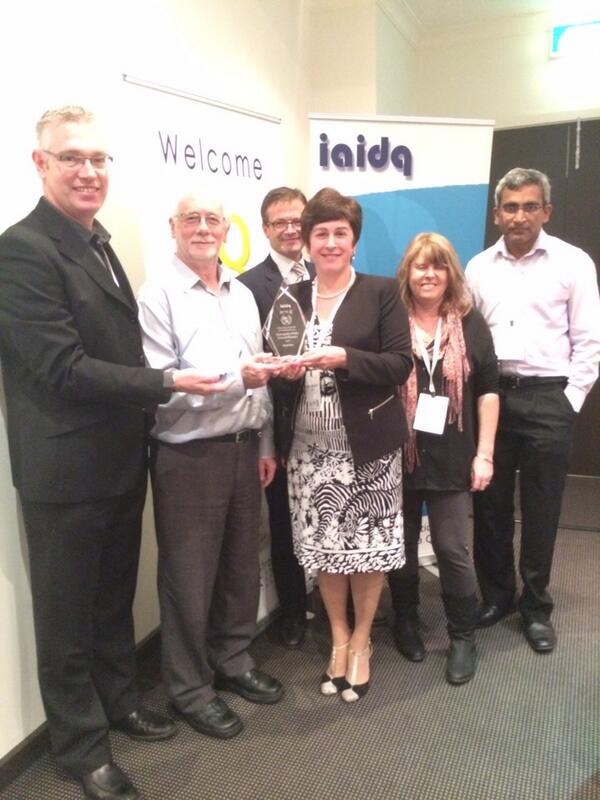This week, I was honoured to be invited chair the DataQuality Asia Pacific Congress, this year held in Melbourne.
(Special thank you to Sangita Rai and Katelyn McGee from ArkGroup for preparing such
a well-run event.)
For me, the event is one of the highlights of the Information
Management calendar and this year’s Congress featured two days of conference
proceedings, together with an additional day of in-depth workshops (including
my own half-day session on Managing for Effective Data Governance, presentation materials for which are available here.)
Participants in the conference came from commercial, public and
not-for-profit sectors and featured contributions included: Melbourne Water,
Telstra, National Australia Bank, Australia Post, Insurance Australia Group,
ANZICS, Mater Healthcare Services, Australian Bureau of Statistics. Contributions
for the vendor and service provider community included presentations from ExperienceMatters, Accenture and BigData-Startups.com.
 |
| Telstra: Winners of the DQAPAC Enterprise Award for 2014 |
In addition to the main conference, the Asia Pacific chapter of the InternationalAssociation for Information and Data Quality (IAIDQ) presented the 2014 Data Quality awards, with honours going to:
Project Award: Winners: Mater Healthcare Services; Runner-up Telstra.
Enterprise Award: Winner: Telstra. Runner-up; SBI Insurance.
There was so much to take in throughout the two days that it’s pretty tough to try and summarise everything! (I will probably revisit some topics in more depth in future posts…) But for now, here are my “top 10” highlights:
1. Data Quality is boring!
Or at least, it can be perceived to be boring by people who aren’t
actively engaged. Passionate people are needed if the data is doing to be cared
for, so you need to engage in a manner that is relevant to the business
community, not concentrate on the practitioner processes. Use language and
examples that are business-oriented. Make it fun!
Branding is also a crucial element of the communication process –
it raises the visibility of Data Quality & Governance, and makes it more
engaging. (e.g. meet Deekew, the mascot for data quality at SBI Insurance.)
2. Learn from you mistakes
Don’t repeat the failures of before. Projects should incorporate a
“Long Hard Look” exercise at the start of a project phase as part of project
initiation and planning, not at the end of a project (when the lessons will
quickly get forgotten).
3. Plan for change, and
expect to change your plans.
Having a good plan will enable you to adapt later. But don’t
adhere rigidly to the plan, because reality never turns out the way you though
it might. Be flexible, be adaptable, be responsive, and be available.
4. Identity Management and
Federated MDM
The concepts of “Party” and “Roles” are critical to enabling a
single consolidated understanding and unique identification of each “customer.”
At some point, an individual could play any number of roles in interacting with
the organisation (e.g. customer, member of staff, supplier, broker, agent,
benefactor, consultant…. IAG currently recognise 37 valid roles that a Party
may play.) The concepts of Party and Role require constant ongoing education to
the business.
5. Customer-Centric =
Information-Centric
To enable a customer-centric approach, an information-centric
enterprise view is foundational; it enables both cross-application integration
and analytic insight. System- and Process-centric architectures drive
compromises (because of silo thinking being built-in by design). As a result,
data quality suffers. We need to have an information-centric architecture to
overcome this.
6. Data Quality Declaration
The Australian Bureau of Statistics (ABS) publishes a Data Quality Declaration statement
(DQD) with each data set it issues. The DQD provides contextual and narrative
guidance to data consumers as to the relative suitability of the data set
within a given context. The consumer can then adjudge whether or not the data
set is suitable for their purpose.
7. “The data is always
right”
A data quality error indicates a failure in the process, the
system or the people. Use the data to inform and drive process change.
8. Data Quality by Design
In manufacturing, the production line would stop if there was a
failure in the quality of products. Why is it not the same with failures in
data entry?
Note that the just because we have the ability to profile a
feature doesn’t mean we should! 100% data quality is almost never necessary (at
least for analytic decision-making). Pragmatism should be applied to prioritise
profiling and remedial efforts.
9. Useful Reference
Frameworks
Several public domain reference frameworks were identified as
being useful to the Data Quality Practitioner community, including:
10. Data Quality with “Big
Data”:
In “Big Data” environments, the velocity, volume and variety of
data processing create issues for timely measurement of veracity. Compromises
will be necessary and we therefore need to be very clear and pragmatic about
applying our data quality checks:
- When to check.
- What to check.
- What rules apply.
- How frequently to check.
- Where to check (which steps in the data processing flow).
Please do leave a note to let me know your thoughts, or to share any
similar experiences.

Thanks for a great job of chairing and a great summation, Alan.
ReplyDeleteIt definitely was a wonderful event with lots of enthusiasm, energy and (is it possible to use this word in connection with Data Quality?) fun!
Although many enterprises around the world are going backwards and actually loosing the skills, knowledge and techniques that are fundamental to effective data quality, this event showed that there is a collection of enterprises and people who are doing really high quality and innovative work.
It will be interesting to see how far forward they can move their really innovative work by the next congress.
I am looking forward to the day when Data Quality becomes so completely embedded in the day-to-day activities of enterprises everywhere that to talk about it as a subject in its own right would seem absurd!
I wonder if one of this years finalists will be the first to achieve this?
Thanks John - great to meet in person, and thanks again for your stellar contribution. I think a good time was had by all - fun was definitely had!
ReplyDeleteIf the enthusiasm and expertise in the room is anything to go by, we're not lost quite yet... (See also my earlier post on "Opening Pandora's Box for more on this... http://www.informationaction.blogspot.com.au/2013/12/opening-pandoras-box.html )